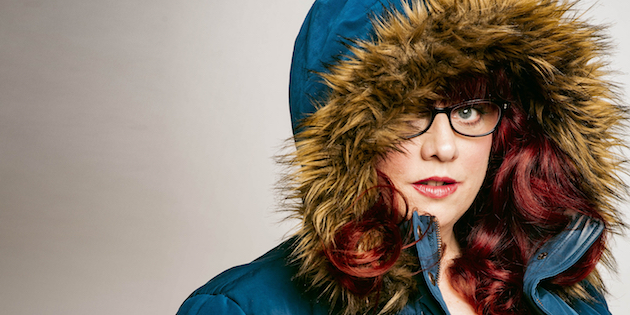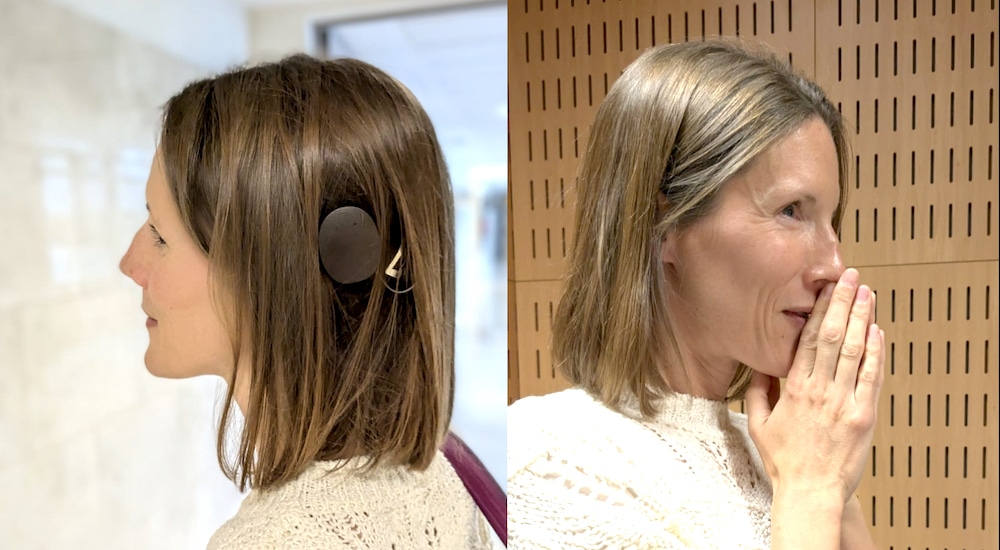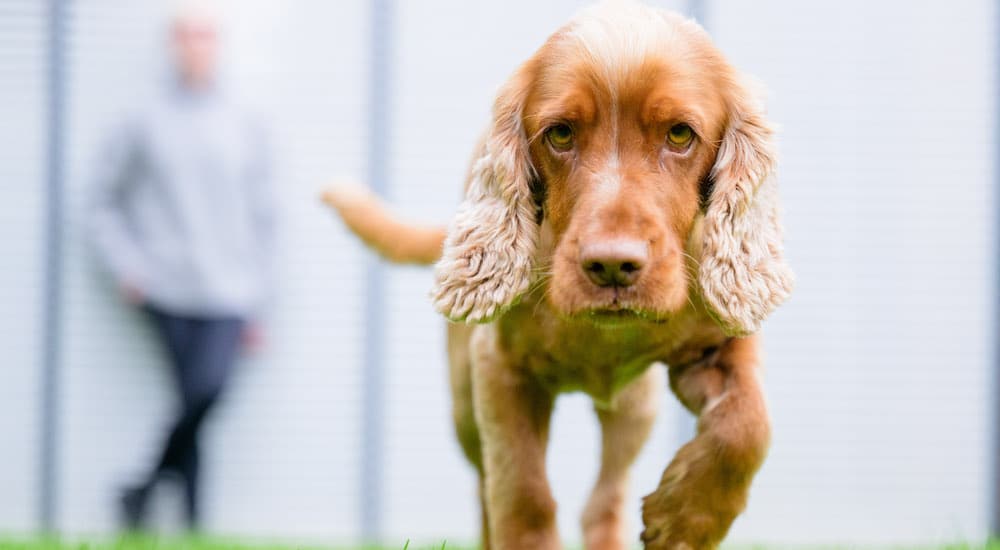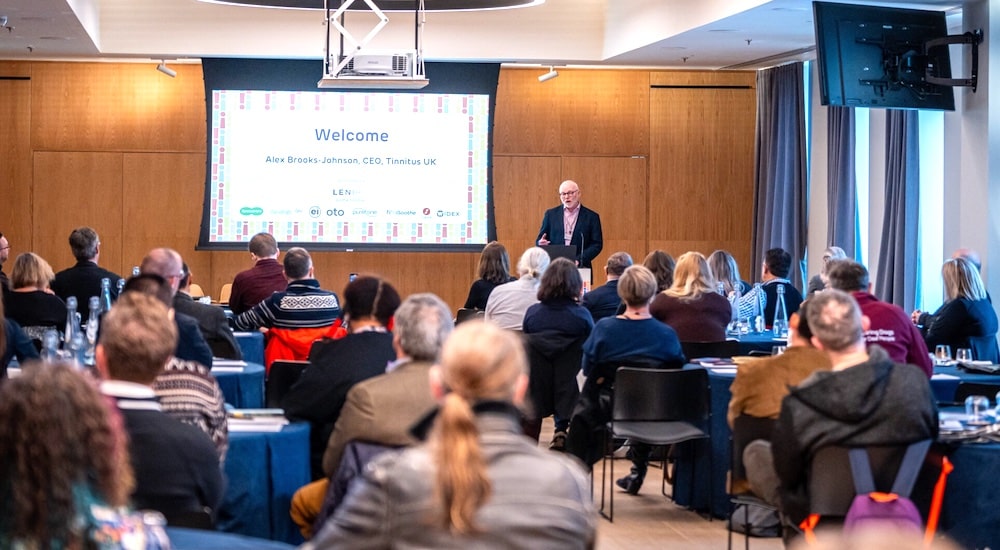Angela Barnes stands up on comedy and hearing loss
culture
If you are suffering from profound loss...of the sense of humour, you may need a modern jester such as Angela Barnes, a hearing aid wearer whose career as a stand-up has made her a star of TV shows such as Stand up for the Week, and radio programmes The Now Show, and Newsjack.

Becoming a comic performer was the answer to many questions in Angela Barnes’ life, and her hearing condition was related to most of them. She did not try stand-up until she was in her thirties, her late father having suggested his comedy-loving daughter get involved through amateur dramatics. “Don’t be silly, that’s for those clever people who went to Cambridge,” she thought. But when her father died, “I thought life’s too short.” Angela was 33 and took a stand-up comedy course at the Komedia in Brighton, where she lived. “Loved it!”
A comfortable place
People who know her from her twenties think she’s shy. When they knew her, she’d sit back in the pub and not join in conversations, but it was her hearing loss, she says, that kept her withdrawn and lacking in confidence. Getting on stage in front of an audience proved way more comfortable than sitting in a pub with six people. “I don’t have that anxiety of ‘am I talking over someone, have I missed an important thing?’ When I’m on stage with a microphone in my hand, it is always my turn to talk. There’s no one I’m interrupting, there’s no one I’m being rude to by ignoring them, so from that point of view, a lot of the anxiety is actually taken away by knowing that I’m in control of the situation. It’s my comfortable place,˝ she explains.
Angela has seen for herself that many comedians have a shyness around people but are quite able to perform, ˝whereas I have this social anxiety but I think it’s born out of my hearing loss; there’s a cause and effect there.˝
Hearing aids
Angela was not wearing hearing aids – she wears them binaurally now – when she started performing, and that had both pros and cons. “I could hear laughs as long as there were enough of them, but what I would sometimes miss, which other performers wouldn’t, was if something happened in the room, for example sometimes I wouldn’t hear a heckle, and in some ways that served me well because I just carried on as if I hadn’t heard it.”
Before she wore aids, this funny girl would often miss her introduction to the stage, and ask someone to push her on when she was announced. At its most comic, this led to confusion when in 2011 she won a BBC New Comedy Award on Radio 2, but from backstage didn’t hear her name announced. ˝Joe Lycett was in my final,˝ said Angela, ˝and we all assumed Joe was going to win because he’s brilliant. I knew they were about to announce the winner, and I suddenly heard the cheer and I went ‘well done, Joe!’ And he went: “It’s you, you idiot, and he pushed me out there.˝ Dazed and confused, out she went, tripping over the mic cable.
Stigma and self-deprecation
Wearing her devices has impacted Angela’s life personally as well as professionally, and her ease with this hearing technology has made her a firm advocate. “I do know at least three of my friends have now got hearing aids since I’ve had them because I bang on all the time about how brilliant they are,” she says.
And like any comedian who points out the absurdity our behaviour, she has a perspective on the stigma long associated with hearing aid use. “To me hearing loss isn’t a sign of ageing because I lost my hearing when I was 18,˝ she maintains. ˝It’s that fear of feeling like you are degenerating in some way, you’re getting old; however, I think that a bigger sign that you’re getting old – rather than wearing hearing aids – is constantly having to ask people to repeat themselves.”
And—sweet music to the ears of the audiology profession and industry—Angela adds: “I want people to treat going for a hearing test like they treat going for a sight test.”
She has found that the stigma is perhaps worse in the UK. “With hearing we have this sort of mental block and it’s quite a British thing; my mum’s from Canada and my family in Newfoundland all wear hearing aids,˝ she said about the shock of finding people who think wearing devices is a perfectly normal thing to do.
˝Life-changing˝ GN ONE
Formerly wearing GN LiNX Quattro hearing aids, Angela Barnes highlights two major improvements she has found since she changed to the new GN ReSound ONE device. The first is sound quality.
“The only way I can describe it is that, to me, my voice sounds more natural. With the other hearing aids, it sounded processed, like hearing myself on the phone or something. With the microphone-in-ear (M&RIE) there is a sort of clarity, and less of a processed quality.˝ The second big difference Angela underlines is absence of feedback, particularly noticeable in studio work when wearing headphone monitors (cans). “I do a lot of radio work and voiceover work and often have to wear cans, and the problem I always had is that they would feed back.” This forced her to work without the headphones, but it meant not being able to regulate the volume of her voice. “It makes such a difference. It means I can hear what the producer is saying to me, I can hear any cues that are being fed through without my microphone picking them up.”
Angela wears her hearing aids in both ears all day long, since she needs the phone connectivity and, particularly during the pandemic, makes use of the streaming function while working. “The one thing I do have to remember to do is to turn my phone off when I go on stage, because I’ve been on stage and my phone has started ringing in my ears!” Angela describes her new devices as “life-changing”.
Glue ear
Prone to ear infections as a child, Angela Barnes was not aware of her hearing loss until she reached her late teens. Her glue ear wasn’t identified early and she was in her twenties before she was treated with grommets. As a result of recurrent infections, Angela’s eardrums are very scarred. She has tympanosclerosis (calcification of the tympanic membrane), so her eardrums do not vibrate properly. Told that she would never grow out of glue ear, she “worked out that my diet affected my hearing quite a lot. If I had too much dairy, that would increase production of the mucous and the glue”. Told in her twenties that hearing aids would not work well with her fluctuating hearing loss, she “just dealt with it” becoming reliant on lipreading (not formally) and subtitles. “It made me very introverted actually. I did go through quite a period of shyness and anxiety and depression in my 20s, which certainly was exacerbated by the hearing loss,” admitted Angela. Her loss is in both ears, the right worse than the left.
A platform for hearing loss?
Actors interpret but comedians who, like Angela, write much of their own material have more power to influence opinions. So, as an advocate of hearing aid use, does she use her position as someone with an audience to shape thinking on hearing health?
˝Some comedians do see themselves as very much identifying with a group and wanting to represent that group in their comedy, and that’s fine, whereas I have much more of an everywoman approach to it and go ‘well, let’s just comment on what’s going on and what I think is crazy and what I don’t’.˝
But it is important for Angela to connect with other people facing her problems. ˝With hearing loss, I feel a little bit differently about it because I am happy to talk about it and I am happy if people want to tweet me and ask ‘where should I go for help?’ »
But she does not push the point and make hearing loss any more a part of her material than it warrants for its independent comedy value. ˝I don’t define myself by those things. I don’t want to be the comedian with hearing loss, the comedian with depression, because I think the best way to challenge preconceptions about those things is not to make a big deal about them, just mention them in passing. The best way to challenge stigma is not make a big deal, just make it part of the conversation,˝ she explains.
But if the subject appears in her performances, its value can extend beyond laughter and into more personal spaces with people out there. “I do have a hearing loss and sometimes that leads to funny situations. Sometimes I’ll mishear something and it’s funny. I don’t want people to feel that they can’t laugh at that.” And she admits that there is value in being able to laugh at your own hearing loss, and in sharing a self-deprecating humour just as long as people know where the lines are. “Yeah, I think anybody with any degree of disability has used it in a way to sort of deal with the elephant in the room. I always say it’s much easier for me to take the piss out of myself before anyone else gets a chance to.”
The world of comedy
Time was when hard-of-hearing film and sitcom characters who mixed up “hearing test” with “hairy chest” were legitimate comic targets. Even the most refined scriptwriters looked to them as material for what was then a reproach-free chuckle. Repeated lines of “eh?” and “what?” could allow half-hour comedy stars to act out frustrations that all but the deaf in society would laugh at and identify with. But even though the auditory problems of this aid-wearing UK comedian would justify her lashing out at that kind of disability humour, she takes a benign and thoughtful view of it, one framed in a deep understanding of comedy that even embraces the value in making fun of her own hearing loss. “Obviously with today’s eyes we look back at that comedy from the 60s and we recoil in horror at what they were saying at the time, but I think if you were there at the time your taboos and parameters would have been different,” posits Angela. ˝Right now we’re in a strange time; you have to take the consequences of what you say. You can be called out on it. It does make you more guarded.”
And she admits: “There are jokes I might have made ten years ago on TV that I wouldn’t make now just because I can’t be bothered with arguing with people on Twitter about it. You’re not allowed any ambiguity any more.”
In our highly politicised world, the stand-up with a hearing problem can find no escape from the scrutiny and the polarisations, but Angela Barnes carefully nuances the scene: ˝Like any, for want of a better word, disability, I can make jokes about it because I experience it, but I wouldn’t make jokes about cerebral palsy, for example. Most comedians now, we’re about punching up not punching down. Either you’re the butt of the joke or someone who deserves it is.”
The sound joke
Athough the history of comedy has produced plenty of purely visual products, the era of silent films providing over two decades of masterful mute works to which cinema as a whole owes a tremendous debt, the need to hear the joke has been essential to getting it for close to a century. It is not easy for hearing-impaired persons to keep up with the intricately-coded aural information. We all need to hear not only what is said but also, in order to catch important references, what has been said at different past moments. And modern humour is dense with current affairs references, not all of which can be read. Without special help, aural humour is out of bounds for the profoundly deaf.
“I do think about that a lot,” says Angela. “I can’t imagine what it would be like [to be profoundly deaf]. I do quite a lot of comedy on the radio and it’s very different to doing live performance or TV where I can’t rely on my facial expressions or hand gestures at all.”
Angela points to the difficulties posed by the translational nature of comedy, underlining the brilliant work done by sign language interpreters, who sometimes work with stand-ups, but stressing that “you are always going to lose things in translation”, be it to BSL or another language.
“Comedy is largely about word play and that’s why a lot of it doesn’t work in translation. It requires you all having a common knowledge of a language for it to work, so yes, hearing is really important,” she adds.
This also makes captioning comedy live a job of great skill and comic timing, in which those professionals almost have to be comedians themselves. “Absolutely, because it’s not like being a court stenographer, where you just get the facts down, you’ve got to somehow get across where the humour is. It’s a real skill for the people that do it,” Angela underlines, explaining that captioners will chat to the performers beforehand to get a sense of what is coming, and that the process itself can become an impromptu part of the stand-up’s act. “The other nice thing about stand-up is, because it isn’t scripted, you can have a bit of interplay and interaction with the captioners themselves, and comedy comes out of that as well.”
The UK – carry on laughing
From Brighton to the BBC, where Angela’s comedy work is frequently channeled through radio, the route has provided her with a first-class view of laughter in the UK, a country that she believes ˝has comedy in its DNA˝. But this country, in which even the greatest comic stars are seen as entertainers rather than great artists, could take greater care of its comedy heritage. Angela recognises the need for support to keep the comedy scene going, and believes that the coronavirus pandemic has put comedy platforms under such pressure that the Arts Council has finally had to acknowledge that comedy is part of the arts scene. “I think the attitude we have to comedy in this country is the difference between entertainment and art, and comedy is resolutely not seen as an art. We’re not eligible for arts council funding or anything like that,” says Angela. “Comedy clubs and comedy tours in theatre bring a lot of money into the economy and British people in particular love comedy. And it transcends class.” she adds. And if her heart is now there in comedy, that must be home. It sounds like it: “I feel like the luckiest person in the world. I stumbled into this career when I was 33 and I’m just enjoying the ride while it lasts.”
Source: Audio Infos #140 Jan-Feb 2021 as Comedy of ‘Earers



